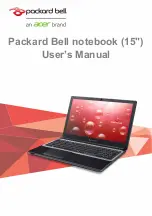
105
G l o s s a r y
Glossary
1394
A fast external bus that allows transfer rates of up to 400
Mbps.
54g
54g is a wireless communications architecture from
Broadcom Corporation that allows data transfer at up to
54 Mbps, nearly five times the speed of the IEEE 802.11b
standard. 54g is backward-compatible with IEEE
802.11b, and operates at the same 2.4 GHz frequency.
AC Adapter
A device which converts the AC voltage from a wall
outlet to the DC voltage needed to power your LifeBook
notebook.
ACPI
A power management specification that allows the oper-
ating system to determine the amount of power given to
each connected device.
Active-Matrix Display
A type of technology for making flat-panel displays
which has a transistor or similar device for every pixel
on the screen.
ADSL
Asymmetric Digital Subscriber Line
Technology for transporting high bit-rate services over
ordinary phone lines.
AGP
Accelerated Graphics Port. High-performance, compo-
nent-level interconnect that enhances 3D graphical
display.
APM
Advanced Power Management.
Auto/Airline Adapter
A device which converts the DC voltage from an auto-
mobile cigarette lighter or aircraft DC power outlet to
the DC voltage needed to power your LifeBook note-
book.
BIOS
Basic Input-Output System. A program and set of
default parameters stored in ROM which tests and
operates your LifeBook notebook when you turn it on
until it loads your installed operating system from disk.
Information from the BIOS is transferred to the installed
operating system to provide it with information on
the configuration and status of the hardware.
Bit
An abbreviation for binary digit. A single piece of
information which is either a one (1) or a zero (0).
bps
An abbreviation for bits per second. Used to describe
data transfer rates.
Boot
To start-up a computer and load its operating system
from disc, ROM or other storage media into RAM.
Bus
An electrical circuit which passes data between the CPU
and the sub-assemblies inside your LifeBook notebook.
Byte
8 bits of parallel binary information.
Cache Memory
A block of memory built into the micro-processor which
is much faster to access than your system RAM and used
in specially structured ways to make your overall data
handling time faster.
CardBus
A faster, 32-bit version of the PC Card interface which
offers performance similar to the 32-bit PCI
architecture.
CD-R
Compact disc - read. A CD-R disc allows you to record
to it once, then play it repeatedly. CD-R’s typically
contain about 640 MB of data.
CD-ROM
Compact disc read only memory. This is a form of
digital data storage which is read optically with a laser
rather than a magnetic head. A typical CD-ROM can
contain about 640 MB of data and is not subject to heads
crashing into the surface and destroying the data when
there is a failure nor to wear from reading.
CD-RW
Compact disc - read/write. A CD-RW disc allows you to
record to it multiple times, then play it repeatedly. CD-
RW’s typically contain about 640 MB of data.
CMOS RAM
Complementary metal oxide semiconductor random
access memory. This is a technology for manufacturing
random access memory which requires very low levels of
power to operate.
COMM Port
Abbreviation for communication port. This is your
serial interface connection.
Command
An instruction which you give your operating system.
Example: run a particular application or format a floppy
disk.
Configuration
The combination of hardware and software that makes
up your system and how it is allocated for use.
Brie4-B6FH-0391.book Page 105 Tuesday, October 14, 2003 10:05 AM
Summary of Contents for Lifebook C2230
Page 2: ...L i f e B o o k C S e r i e s N o t e b o o k ...
Page 6: ...L i f e B o o k C S e r i e s N o t e b o o k ...
Page 7: ...1 1 Preface ...
Page 8: ...2 L i f e B o o k C S e r i e s N o t e b o o k ...
Page 10: ...4 L i f e B o o k C S e r i e s N o t e b o o k S e c t i o n O n e ...
Page 11: ...5 2 Getting to Know Your Computer ...
Page 12: ...6 L i f e B o o k C S e r i e s N o t e b o o k S e c t i o n T w o ...
Page 29: ...23 3 Getting Started ...
Page 30: ...24 L i f e B o o k C S e r i e s N o t e b o o k S e c t i o n T h r e e ...
Page 38: ...32 L i f e B o o k C S e r i e s N o t e b o o k S e c t i o n T h r e e ...
Page 39: ...33 4 User Installable Features ...
Page 40: ...34 L i f e B o o k C S e r i e s N o t e b o o k S e c t i o n F o u r ...
Page 54: ...48 L i f e B o o k C S e r i e s N o t e b o o k S e c t i o n F o u r ...
Page 55: ...49 5 Using the Integrated Wireless LAN Optional device ...
Page 56: ...50 L i f e B o o k C S e r i e s N o t e b o o k S e c t i o n F i v e ...
Page 77: ...71 6 Troubleshooting ...
Page 78: ...72 L i f e B o o k C S e r i e s N o t e b o o k S e c t i o n S i x ...
Page 92: ...86 L i f e B o o k C S e r i e s N o t e b o o k S e c t i o n S i x ...
Page 93: ...87 7 Care and Maintenance ...
Page 94: ...88 L i f e B o o k C S e r i e s N o t e b o o k S e c t i o n S e v e n ...
Page 98: ...92 L i f e B o o k C S e r i e s N o t e b o o k S e c t i o n S e v e n ...
Page 99: ...93 8 Specifications ...
Page 100: ...94 L i f e B o o k C S e r i e s N o t e b o o k S e c t i o n E i g h t ...
Page 104: ...98 L i f e B o o k C S e r i e s N o t e b o o k S e c t i o n E i g h t ...
Page 108: ...102 L i f e B o o k C S e r i e s N o t e b o o k ...
Page 109: ...103 9 Glossary ...
Page 110: ...104 L i f e B o o k C S e r i e s N o t e b o o k S e c t i o n N i n e ...
Page 116: ...110 L i f e B o o k C S e r i e s N o t e b o o k S e c t i o n N i n e ...
Page 120: ...114 L i f e B o o k C S e r i e s N o t e b o o k ...










































